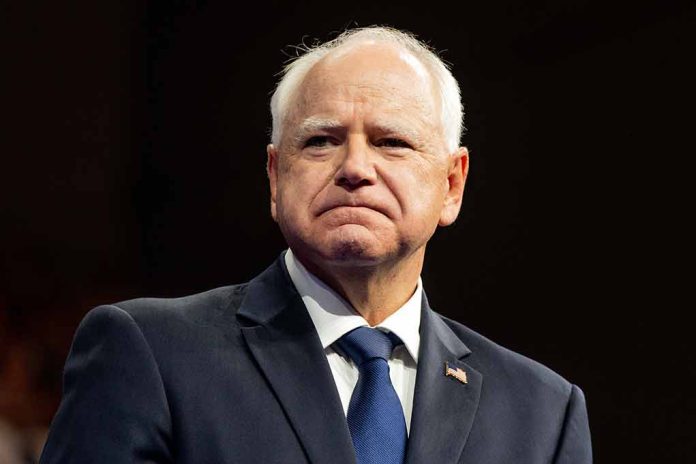
Governor Tim Walz of Minnesota faces backlash for fundraising while Hurricane Helene wreaks havoc in the southeastern United States, leaving over 1,000 missing and at least 100 dead.
At a Glance
- Governor Tim Walz criticized for campaign fundraising during Hurricane Helene crisis
- Over 1,000 people missing and at least 100 confirmed dead in affected areas
- Walz’s actions compared unfavorably to President Trump’s active involvement in aid efforts
- Hurricane Helene causing widespread destruction and flooding in southeastern states
- FEMA and partner organizations coordinating response efforts
Walz’s Controversial Fundraising Amid Crisis
As Hurricane Helene continues to ravage the southeastern United States, Minnesota Governor Tim Walz finds himself at the center of a political storm. The governor’s decision to engage in campaign fundraising activities during this time of crisis has drawn sharp criticism from many who view his actions as insensitive and out of touch with the suffering of those affected by the hurricane.
The contrast between Walz’s actions and those of other political figures, particularly President Trump, has only served to intensify the backlash. While Walz focused on campaign finances, Trump has been actively involved in delivering aid and support to the affected regions, highlighting a stark difference in priorities during this national emergency.
Hurricane Helene’s Devastating Impact
Hurricane Helene has proven to be a catastrophic event, causing widespread destruction across Florida, Alabama, and Georgia. The storm’s rapid intensification from a tropical storm to a Category 4 hurricane within just two days caught many off guard, leading to a dire situation with over 1,000 people reported missing and at least 100 confirmed dead.
The Federal Emergency Management Agency (FEMA) and its partners have been working tirelessly to coordinate response efforts. Teams and supplies have been pre-positioned in regional distribution centers to provide immediate assistance to those in need.
Political Fallout and Response
The hurricane’s impact has reverberated through the political landscape, affecting the plans and actions of various political figures. Vice President Kamala Harris cut short her campaign visit to Las Vegas to return to Washington for briefings on the hurricane response. Meanwhile, former President Donald Trump visited Valdosta, Georgia, to assess the storm’s damage, though his visit was not without controversy.
“Biden criticized Trump for ‘lying’ about federal contacts with Georgia officials during the response to Hurricane Helene. Trump falsely claimed during a tour of the damage that Biden hadn’t been in touch with the state’s Republican governor. ‘He’s lying, and the governor told him he was lying.'”
The White House quickly refuted Trump’s claims, stating that President Biden had indeed spoken with Governor Brian Kemp and offered assistance. This exchange highlights the ongoing political tensions even in the face of a natural disaster, with each side accusing the other of mishandling the situation or spreading misinformation.
Climate Change and Future Storms
Hurricane Helene’s rapid intensification has reignited discussions about the role of climate change in exacerbating extreme weather events. Climate scientists point out that warmer ocean temperatures, a direct result of climate change, contribute to the formation of larger and more powerful storms.
As the recovery efforts continue and the political fallout unfolds, the stark reality of Hurricane Helene’s devastation serves as a somber reminder of the increasing threat posed by extreme weather events. Governor Walz’s actions during this crisis may have long-lasting implications for the Harris-Walz campaign, while the broader discussion about climate change and disaster preparedness is likely to intensify in the wake of this catastrophic storm.







